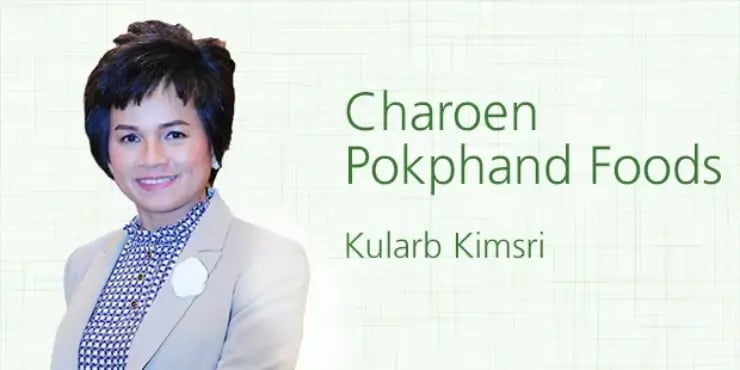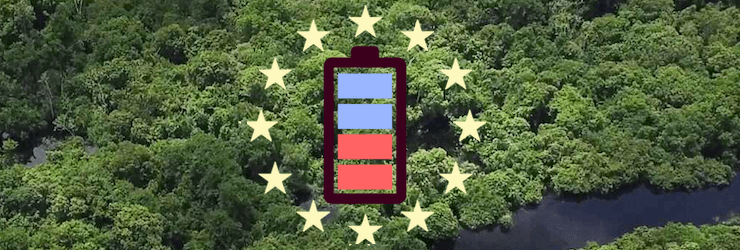I’d like to introduce you to Kularb Kimsri, Vice President at the Global Standard System Centre of Charoen Pokphand Foods Public Company Limited (CPF). CPF is the biggest company in Thailand’s agricultural industry and is one of the pioneers in environmental management. The company received carbon footprint labels for more than 150 products. Ms. Kimsri is an expert for the reduction of the carbon footprint throughout the supply chain and gives insights in her projects in this interview.
Charoen Pokphand Foods (CPF) is the leading agro-industrial and food conglomerate in the Asia Pacific region. CPF’s goal is to become the “Sustainable Kitchen of the World”. What is the company’s motivation behind that goal?
Daily increases in the world’s population often results in an increase in the needs for food as well. Due to limited natural resources, industries must gear themselves towards resource efficiency. CPF therefore feels the need to develop efficiency in its animal protein production, for which the company adopts the fully integrated supply chain as well as the Feed, Farm and Food business models. CPF applies the Life Cycle Assessment (LCA) universal principle, in order to find the Hotspot and lead towards the development of resource efficiency within its production process. Necessities to make this happen include tools for measurable performance, which will allow CPF to monitor the progress and motivate CPF’s objective in becoming the “Sustainable Kitchen of the World”.
CPF received carbon footprint labels for more than 150 products. Does this have a positive impact on the business?
Exactly, it does have a good impact on CPF. The company has low carbon food products, which allows itself to step towards a greener economy and build a value perception for sustainable products among its customers and stakeholders. As a result, customers and stakeholders have access to food products which do not only provide quality and safety, but also help in the reduction of global warming for the benefit of the global society.
What was your favorite carbon footprint project, maybe you can give a brief example?
I was most impressed in the “Carbon Footprint Reduction Label” of fresh chicken meat, which is where we started off using software to analyze carbon footprints in our chicken meat. Our objectives are to find hotspots that lead towards reductions in our greenhouse gas emissions. We discovered that CPF’s chicken meat releases less than 50% of the average amount of greenhouse gas for the Thai chicken meat industry.
What was the biggest challenge that you faced to reduce the greenhouse gas emissions?
Livestock production greatly contributes to the release of greenhouse gas. Hence, the important challenge of carbon footprints along the whole supply chain lies in reducing the greenhouse gas emissions in livestock production. It is challenging that the R&D of feed formulation and process innovations to reduce the Feed Conversion Rates (FCR) of animals, focuses on the cost-effective usage of resource, but at the same time the outcome should be low carbon foods.
An important factor that allows simple and transparent completion of analysis results is the availability of software that link information from the company’s ERP to the LCA software mode of analysis. This is a way to simplify and create transparency of information.
Do you work according to one standard (like PAS2050) or does it vary in different projects?
The Carbon Footprint Project of CPF has been complied with many standards, which include PAS 2050, ISO/TS 14067, ISO 14040 and ISO 14044. CPF is also interested in multi indicators that measure environmental and social performance in other dimensions, such as ISO 14045: Eco-Efficiency Assessments.
What will be the next steps in CPF’s environmental management?
CPF will expand its sustainability projects in the productions of “fresh chicken” and “cooked chicken”. Since 2012, these products have been approved by the ProSustain standard of DNV-GL. We have analyzed the environmental and social impacts of this project in 6 dimensions in the layout of multi-indicators, which goes beyond our carbon footprint projects. Our purpose is to motivate environmental management according to the guidelines of the UNEP: sustainable consumption and production (SCP), and correspond to the Sustainable Development Goals (SDGs Goals).
Thank you Ms. Kimsri!
More information about CPF can be found here.






